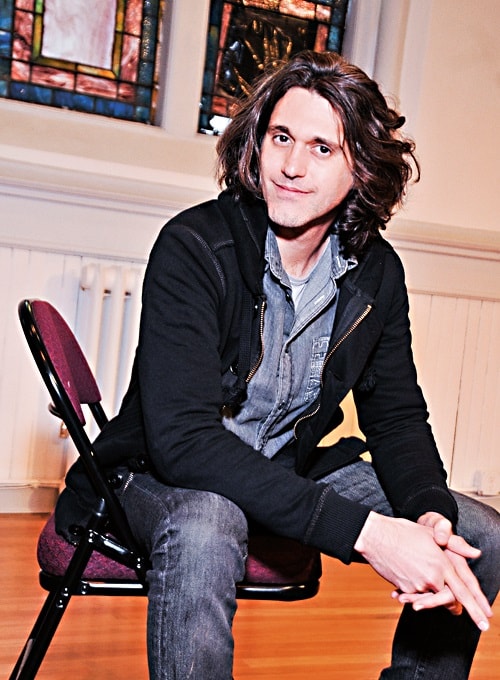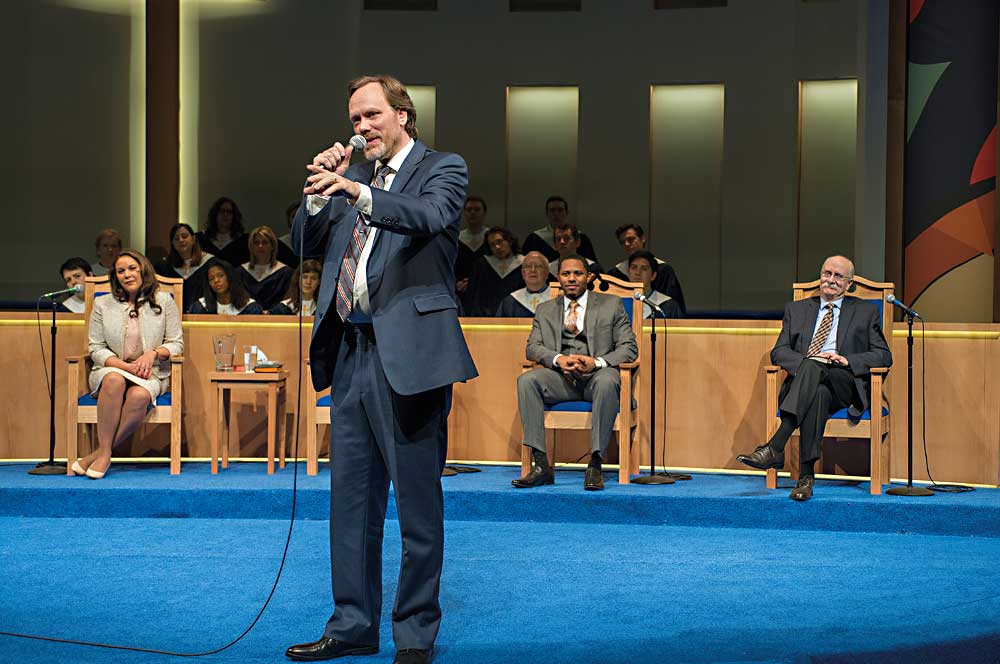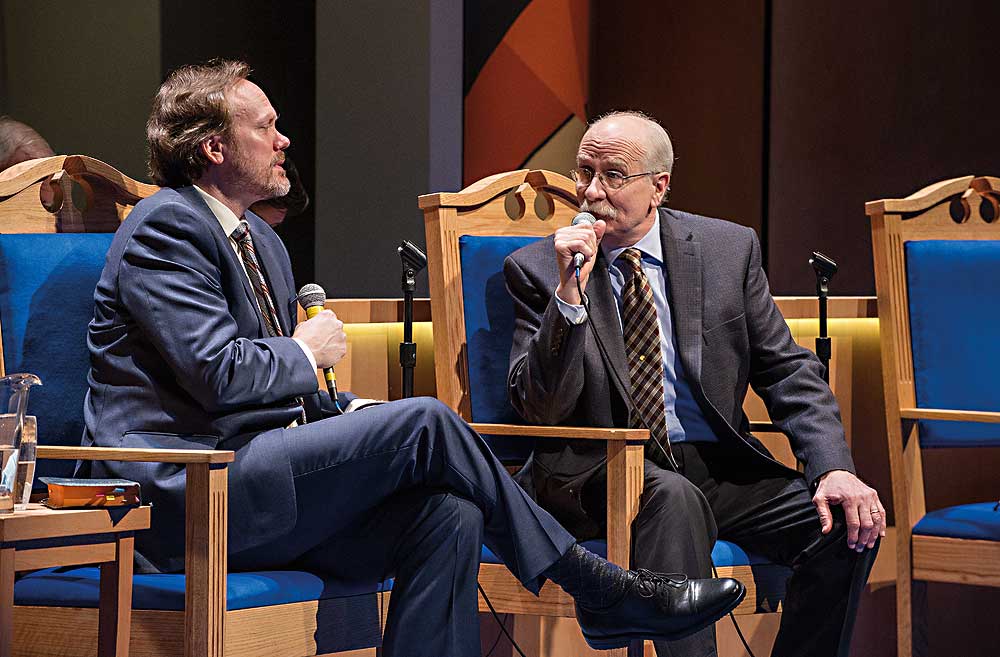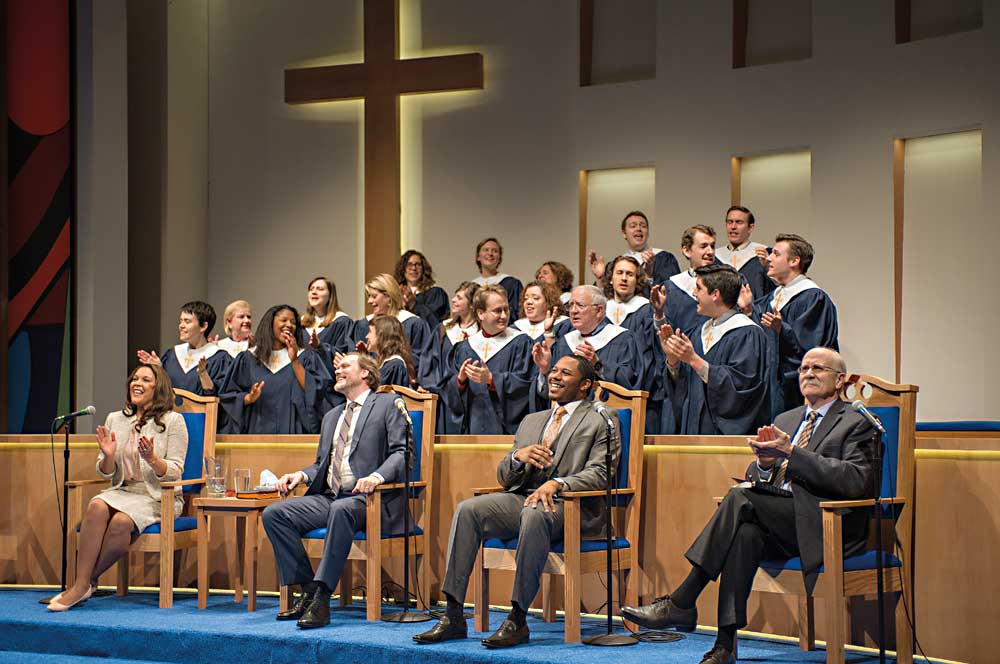
Les Waters and Lucas Hnath met at Actors Theatre of Louisville in 2012, when Waters had just stepped into the artistic director position and Hnath’s play Death Tax was part of the Humana Festival of New American Plays. After seeing the production, Waters knew he wanted to work with Hnath, which led to a commission, The Christians, that played ATL’s 2014 Humana Festival of New American Plays. The play, done in the form of a church service, follows a megachurch pastor, who delivers a controversial sermon and the repercussions of his words on his congregation.
Below, the playwright and director discuss their first, and hopefully not last, collaboration.
The full playscript of The Christians can be found in the September ’14 print issue of American Theatre.
LES WATERS: How did the idea for The Christians come to you?
Lucas Hnath: For several months, I was pursuing one idea, a play called Kanye West Performs the Rise and Fall of George W. Bush. It would be a Kanye concert in which Kanye tells the story of Bush’s second term, playing the character of Bush. I decided it was an idea not worth pursuing because I didn’t want to get Kanye too interested in what I was doing and get in trouble with him. But, funnily enough, from that idea came this interest in making something that felt like a big public forum—something provocative, right down to the title of the play, something that kind of catches your interest and you say, “Oh, are you really going to make that? Are you really going to put that onstage?”I like that experience of an audience feeling suspicious of the thing and then having that expectation turned upside down. I actually think, long-term, that makes for a better experience. The title is provocative, even though there’s so little to it—it’s the most minimalistic title I could come up with for the play. Young Jean Lee had already taken Church. [Laughs] I was really mad at her. It’s like, “Ahh, if only you had not taken that title.” I had so many titles in mind.
Did you?
Yeah. I mean, they’re terrible. [Laughs] There was a time when I was playing around with variations on Hell Hath No Fury. At one point, I called it Hell Hath. [Laughs] What normally happens is I go through a period of having just utterly awful titles, and then I just go for the easy one.
My joy in directing it was that it felt necessary—a piece that you as a writer had a real necessity to write. We talked about you not wanting to write a satire, because that’s familiar territory. But what was the necessity you felt in doing it?
My mother is an ordained minister, so I grew up, certainly, in that world. But in some ways that’s the least interesting answer. I’ve been thinking a lot about: Does a play need to be written? Does it fill a gap? And I felt there was something missing in how Christianity tends to be represented onstage. Far too often it’s satirical, or there’s a little of this feeling of, “Oh, those other people that believe this thing,” and that kind of “othering” seems deeply problematic. I did not figure out how to write the play until I realized that the play is not about believers versus nonbelievers; it’s about a doctrinal controversy within the faith. That way we don’t have an “other” in the play. It’s believers versus believers, and the audience is put in the middle of that debate. I was really interested in making something that spoke to people who identify as secular and people who identify as Christian.

I had a concern that people would think a group of middle-class liberals in a theatre was satirizing something. Very early on, there was a vague smell of suspicion from faith-based audiences: Is this going to be the case? That was very quickly dispelled. I think surrounding it was a kind of really interesting confusion—were we actually in a church? At the beginning of the play, when Pastor Paul says, “Let us pray,” you would see people—myself included—bowing their heads as if they were in church about to pray. Then I would look up, and think, “Good Lord, I’m not in a church, I’m the director. I’ve got to look at this!” [Laughs] People would come up to the actors after the show and say, “I believe what you believe.” And the actors would often respond by saying things like, “Well, I’m acting. I don’t necessarily believe that.” I remember one night when a woman said, “But you just said it. You just stood there and said it,” and the actor said, “That’s my job.” And she said, “Yes, but in the moment you were saying it, you obviously believed it.” And I was really fascinated: Do some people find it difficult to dissociate the character from the actor?
I’ve made a point of learning all the ways to sneak out of the theatre so I would not have interactions with audience members. I became very concerned that they would want to get into a debate with me. The play does not provide any sort of conclusive answer, and they would probably try to get one out of me, and I knew that that was a dangerous thing. You don’t want to give the audience that sort of release when you’re trying to make a play that’s really asking you to come up with your own answer, or to come up with your own method of speaking about this problem. So I had made a point to really limit how much I talked to audience members afterwards.
Did you ever come up with an answer for yourself?
I have a very complicated opinion, but I’ve made a point of not revealing any of what I think about it. If you go in with some thought of what the playwright believes or does not believe, it can actually ruin how the play works. The tensions and ambiguities in the play start to go away when you watch it through that filter. So, I’ve made a vow of silence on talking about my own beliefs.
Several cast members had been raised in some form of Christianity, and I certainly was. My grandfather on my mother’s side was a preacher. That creates community, the feeling that you belong to something, to a large group of people, and if something happened to you, that group of people would look after you.
The side discussions that were related to the play had much more to do with the conflicts in the play, not as they relate to theology, necessarily, but like the fights a couple has, or the problem of leadership. It’s sort of been more about finding the non-theological corollaries in order to kind of ground the thing in an emotional reality.
I thought there should be a special performance of the play for all artistic directors. It seemed a valid, interesting play about the leader of an institution, making a decision that you profoundly believe is in the best interests of all those people that you lead, and then to be told by the people you’re leading, actually this is not what they want.
The first time that we worked on the play together was at the Kennedy Center, and we did the first read-through off-mike, and it was terrible. [Laughs] I said, “We will never hear the play off-mike again.” And so, from that point on, even in rehearsals—even on the first day of Humana rehearsal—the play was done only on mike. One of the images I have lodged in my head from the churches I grew up in is the image of the pastor holding the mike, and I thought, “I have to use that element.” What I found is that dialogue is far more interesting spoken into a mike than it is not spoken into a mike. There’s something about the sound of a mike that makes it sound like you’re inside someone’s head. And I also had this impulse that once I start in the form of a church service, it doesn’t matter where the play moves in space and time, but it probably still wants to be using the form of a church service, which of course meant keeping the mikes. And I knew that I was writing a play for you to direct, and I knew that this theatrical device is something that you would probably enjoy. Was the miking a theatrical device you enjoyed?
I did, yes. It’s really fascinating to rehearse and to see which actors embrace it. A lot of the casting process, I recall, was you and I sitting there listening to the quality of somebody’s voice and then thinking, “And what would that sound like when it’s miked?” And because we didn’t have cordless mikes, there’s a whole kind of bizarre choreography.
We called it “micography.”

What’s crucial to the play is having performers with real emotional vulnerability, because what they’re talking about has such high stakes for their characters and is central to their beliefs and how they define themselves. So when things start to crumble, you have to be able to do it—you have to have the ability for that emotional release and still be speaking your dialogue on mike. That’s hard, and an ideal cast would make that look effortless.
It’s funny. The reason why it even occurred to me that we should ask Andrew [Garman], who played Pastor Paul, to come in to read for the role is really based on his work in Tom Bradshaw’s plays, which are very different content-wise. But it’s exactly that quality that Andrew had, of going into a Bradshaw play and playing all those utterly wild scenes with zero judgment. It always struck me as funny that Pastor Paul was cast based off of the work I’d seen him do in Bradshaw’s plays.
The casting process was interesting, because it’s very easy to make value judgments about the characters. The danger is you will listen to somebody and think, “I wouldn’t buy a car from you, let alone believe you on questions of faith.” And I think, because there’s tradition of satirizing certain elements of Christianity, that can creep in very, very quickly. And it unbalances the play.
When I go to write a commission, I actually like to write it for a specific director. I knew that I wanted to work with you on this play, but I wasn’t quite sure what that meant, necessarily. We’re mutual friends with Caryl Churchill, and I asked her, “So I want to write a play for Les. What’s Les really, really good at?”
Oh, my gosh.
Have I never told you this story? She said, “Well—”
I think our time is up.
[Laughter] No, it’s praise. She said, “Of course his taste in design is impeccable.” And she said, “He has incredible taste in actors, and he’s brilliant at casting.” The most important thing she said was, “He is really, really good with difficult emotion.” That was something that stuck with me in writing the play. It means that characters are having emotions that are very contradictory and very knotted up, and that was something that I tried to drive the play toward as much as possible. It was almost like a mantra running through the back of my head.
I can’t believe she said that.
But moreover, early on I had set out to make a play about church politics, and you, in the course of me showing you the very early draft, kind of pulled me away from that theme—just a bit, sort of nudged me away from making it too much about politics and power, and more about the emotional crisis these characters are having. If you had not been there, this would have been a power play. And now it’s something much better.
Les Waters is the artistic director of Actors Theatre of Louisville.


